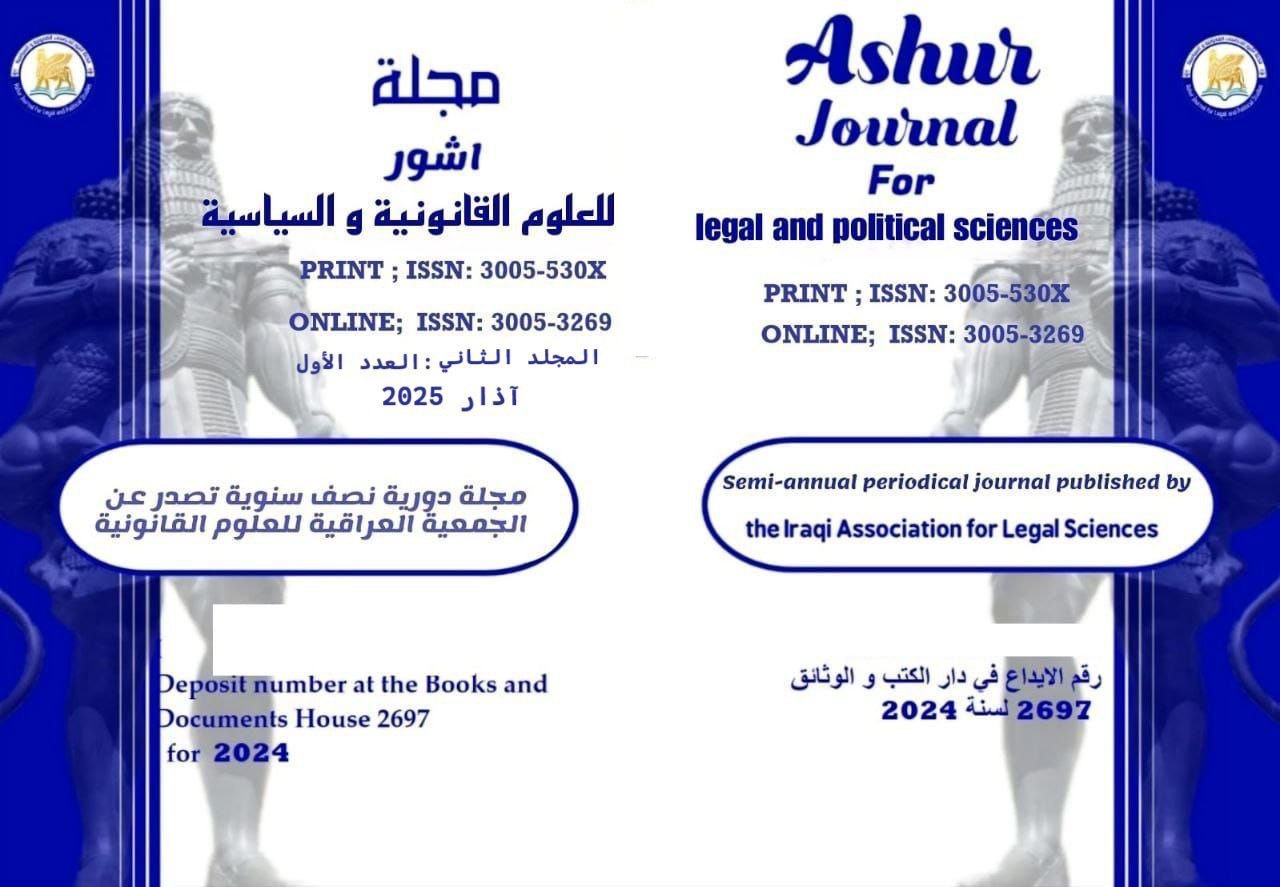Intellectual Terrorism and The Role of Legal Mechanisms in Dealing with it" (Legal Study)
DOI:
https://doi.org/10.64184/ajlps.V2.I1.Y2025.P493-454.29Keywords:
(Intellectual Terrorism, Freedom of Thought and Expression, National Legal Mechanisms, Global and Regional International Legal Mechanisms, Constitutions, National Laws, International Charters, Conventions and Covenants.).Abstract
The thought and thinking process is confined to the inside of the soul, and involves in it, and if it goes from the subconscious to the apparent, announced to people explicitly or indication, so its effect and extension expression were more influential. The external expression of thought esoteric is called the expression of opinion, and it is known that the expression of opinion complementary to freedom of thought, conscience and belief, as it remains incomplete as one was unable to express his ideas and opinions, whether in his conversations and in private councils or in his speeches in councils and public clubs or in his memoirs, articles, books and broadcasts, in this sense, liberties have become sacred and enshrined in all constitutions, declarations of rights and universal and regional international charters. Therefore, it is not permissible to deprive anyone from exercising these rights, by imposing an opinion on him or interfering with his opinions, because we will be facing the phenomenon of intellectual terrorism, which has a greater effect than physical terrorism. Accordingly, the issue of intellectual terrorism is one of the most vital topics and has a great impact, as its danger threatens security and public order in society at the national and international levels, but it is one of the topics that are few addressed, as it did not attract the attention of writers and researchers, despite its complexity and the multiplicity of its patterns and methods, as its wide types and effects occur in our daily lives of strife and sectarian wars, and the spread of extremism and extremist ideas, as well as incitement to violence, to which the visual media contributed. audio and read, as well as contributed to education curricula, lectures and religious discourses, and that religious doctrines and symbols have a role in fanning the fires of intellectual terrorism or in extinguishing them, because of their prominent impact on the lives of individuals and their behavior, and this is what we will address through our study of intellectual terrorism and the role of international legal mechanisms global and regional charters, conventions, covenants and national legal mechanisms of constitutions and legislative and judicial means in addressing it.
References
Sources and References
- The Holy Qur'an
First/ Dictionaries and Linguistic Dictionaries:
1. Abadi, Al-Fayruz, (1301), Al-Qamus Al-Muhit, Vol. 1, Al-Miri Press.
2. Ibn Manzur, Muhammad, (1300 AH), Lisan Al-Arab, 1st ed., Vol. 1, Al-Miri Press, Egypt.
3. Ibn Manzur, Muhammad, (no date of publication), Lisan Al-Arab, edited and compiled by Youssef Al-Khayyat, Vol. 1, Dar Lisan Al-Arab, Beirut.
4. Al-Razi, Muhammad, (1994), Mukhtar Al-Sihah, 1st ed., Dar Al-Kutub Al-Ilmiyyah, Beirut, Lebanon.
5. Al-Razi, Muhammad, (1983), Mukhtar Al-Sihah, Dar Al-Risala, Kuwait.
6. Al-Zamakhshari, Jar Allah, (1979), Asas Al-Balagha, Dar Sadir, Beirut.
7. Al-Fayruzabadi, Majd al-Din, (1980), Al-Qamus Al-Muhit, Vol. 2, Egyptian General Book Authority.
Second/ Legal Books:
1. Al-Hawari, Muhammad, (2013), Revival of Religious Discourse, 1st ed., Dar Al-Nashr Lil-Jama'at, Cairo.
2. Al-Hadith, Muhammad, (no date), Crimes of Incitement and Their Forms in Aspects Affecting External State Security According to Comparative Iraqi Legislation, no date.
3. Al-Dubaisi, Abdul Karim, (2011), Public Opinion: Factors in its Formation and Methods of Measuring It, 1st ed., Dar Al-Maysarah, Amman.
4. Al-Rifai, Ahmad, (2007), International Criminal Responsibility for Infringing on Religious Beliefs and Sanctities: A Study in Light of Freedom of Opinion and Expression, Dar Al-Nahda Al-Arabiya, Cairo.
5. Al-Ruwaili, Saad, (2000), A Guide for the Arab Critic, 2nd ed., Arab Cultural Center, Casablanca.
6. Al-Saqqaf, Hassan, (2007), Wahhabi Salafism: Its Basic Ideas and Historical Roots, 2nd ed., Dar Al-Mizan, Beirut.
7. Al-Shafi'i, Muhammad, (2004), Human Rights Law, 3rd ed., Mansha'at Al-Maaref, Alexandria.
8. Al-Yamani, Muhammad, (1989), The Arab Encyclopedia, 1st ed., Vol. 2, Dar Al-Adab, Beirut.
9. Al-Laqani, Ahmad; Muhammad, Far'ah, (2001), Educational Curricula: Between Reality and the Future, 1st ed., Alam Al-Kutub, Cairo.
10. Jan, Muhammad, (1998), Curricula: Between Authenticity and Westernization, 2nd ed., Dar Al-Tarfan, Saudi Arabia.
11. Khalaf, Ahmad, (1995), Terrorism: Its Causes, Dangers, and Treatment, Al-Salam Press, Cairo.
12. Khalil, Imam Hassanein, (2007), Towards an International Agreement to Defining Terrorist Crimes in Comparative Legislation.
13. Khalil, Louie, (2010), Press Media, 1st ed., Osama Publishing and Distribution House, Amman, Jordan.
14. Shams, Riyad, (1947), Freedom of Opinion and Crimes of the Press and Publishing, Vol. 1, Egyptian Book House, Cairo.
15. Abdel-Barr, Farouk, (1988), The Role of the Egyptian State Council in Protecting Public Rights and Freedoms, Vol. 1, Sejel Al-Arab Press.
16. Afifi, Mustafa, (no date), Moral Rights of the Human Being between Theory and Practice, Dar Al-Fikr Al-Arabi, Cairo.
17. Fahmy, Khaled, (2008), Freedom of Opinion and Expression, 1st ed., Dar Al-Fikr Al-Jami'i, Alexandria.
18. McDonnell, Diane (2001), Introduction to Discourse Theories, 1st ed., translated by Izz al-Din Ismail, Academic Library, Cairo.
Third/ University Theses and Dissertations:
1. Jalal, Hussein (2005), Political Discourse in Ancient Iraq, Master's Thesis submitted to the College of Law, University of Wasit.
2. Khalaf, Walid, Intellectual Rights in Divine Religions and Positivist Theory, PhD Thesis submitted to the College of Islamic Sciences, University of Baghdad.
3. Abdullah, Shihab (2012), Freedom of Belief in Charters and Constitutions, PhD Thesis submitted to the College of Law, University of Mosul.
Fourth/Legal Research:
1. Hamdan, Saeed; Abdullah, Sayyid Jab (1430 AH), The Role of Social Institutions in Achieving Intellectual Security, Research submitted to the National Conference on Intellectual Security (Concepts and Challenges), held from 22-25 Jumada al-Awwal, King Saud University, Saudi Arabia.
2. Kazem, Hassan, (2010), a research published in the Journal of the Message of Law, University of Karbala, second year, volume 2, issue
Fifth/ National Constitutions and Laws:
1. The Basic Law of 1925
2. The Iraqi Constitution of 1958
3. The Iraqi Constitution of April 4, 1963 (Law No. 25 of 1963 of the National Council for the Command of the Revolution)
4. The Iraqi Constitution of April 22, 1964
5. The Iraqi Constitution of April 29, 1964 (Law No. 61 of 1964, as amended)
6. The Iraqi Constitution of September 2, 1968
7. The Iraqi Penal Code, amended No. 111 of 1969, in force
8. The Iraqi Interim Constitution of July 16, 1970
9. The Iraqi Constitution of 2005 in force
10. The Iraqi Anti-Terrorism Law No. 13 of 1964 2005
11. The Egyptian Constitution in force for the year 2014
Sixth/ International and regional charters, declarations, covenants, and agreements:
1. The Charter of the United Nations of 1945
2. The Universal Declaration of Human Rights of 1948
3. The European Convention on Human Rights of 1950
4. The International Covenant on Civil and Political Rights of 1966
5. The American Convention for the Protection of Human Rights of 1969
6. The African Charter on Human and Peoples' Rights1981
7. The French Declaration of the Rights of Man and of the Citizen of 1789
8. The Arab Charter on Human Rights of 2004
Seventh/ Research and Articles Published on the Internet:
• Mohsen Al-Sheikh Al-Hassan, The Danger of Intellectual Terrorism to the Nation and the Citizen, an article published in Al-Sharq newspaper on the Internet, at http://www.alsharq.net.sa, accessed on December 5, 2022.
Eighth/ Judicial Decisions:
1. Egyptian Administrative Court Decision No. 685 of May 11, 1950.
2. Egyptian Administrative Court Ruling in Case No. (251), Seventh Judicial Year, dated June 16, 1953.
3. Egyptian Administrative Court Decision No. 837, S14, Q, of July 9, 1963.
4. Decision of the General Assembly of the Iraqi State Shura Council No. 4/Administrative/Cassation/93 of 2/7/1993
Foreign References/
* Morange, Jean, (2007), Les Libertés Publiques, Presses Universitaires de France -, Paris PUF.
Downloads
Published
Issue
Section
License
The authors retain Full copyright of their published article
Ashur Journal of Legal and Political Sciences applies the Creative Commons Attribution 4.0 International (CC BY 4.0) License to articles and other works we publish. If you submit your paper for publication by AJLPS, you agree to have the CC BY 4.0 license applied to your work.
Articles can be read and shared for under the following conditions:
BY: Attribution must be given to the original source (Attribution)
Full details available at
https://creativecommons.org/licenses/by/4.0/






